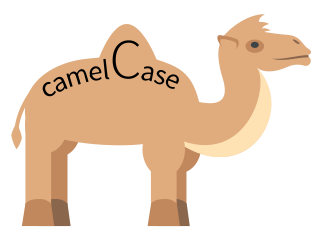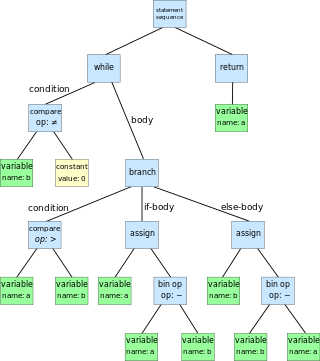In computing, a compiler is a computer program that translates computer code written in one programming language into another language. The name "compiler" is primarily used for programs that translate source code from a high-level programming language to a low-level programming language to create an executable program.

Camel case is the practice of writing phrases without spaces or punctuation and with capitalized words. The format indicates the first word starting with either case, then the following words having an initial uppercase letter. Common examples include YouTube, PowerPoint, HarperCollins, FedEx, iPhone, eBay, and LaGuardia. Camel case is often used as a naming convention in computer programming. It is also sometimes used in online usernames such as JohnSmith, and to make multi-word domain names more legible, for example in promoting EasyWidgetCompany.com.
Interactive fiction, often abbreviated IF, is software simulating environments in which players use text commands to control characters and influence the environment. Works in this form can be understood as literary narratives, either in the form of Interactive narratives or Interactive narrations. These works can also be understood as a form of video game, either in the form of an adventure game or role-playing game. In common usage, the term refers to text adventures, a type of adventure game where the entire interface can be "text-only", however, graphical text adventure games, where the text is accompanied by graphics still fall under the text adventure category if the main way to interact with the game is by typing text. Some users of the term distinguish between interactive fiction, known as "Puzzle-free", that focuses on narrative, and "text adventures" that focus on puzzles.

Perl is a high-level, general-purpose, interpreted, dynamic programming language. Though Perl is not officially an acronym, there are various backronyms in use, including "Practical Extraction and Reporting Language".
Rebol is a cross-platform data exchange language and a multi-paradigm dynamic programming language designed by Carl Sassenrath for network communications and distributed computing. It introduces the concept of dialecting: small, optimized, domain-specific languages for code and data, which is also the most notable property of the language according to its designer Carl Sassenrath:
Although it can be used for programming, writing functions, and performing processes, its greatest strength is the ability to easily create domain-specific languages or dialects

The Standard Generalized Markup Language is a standard for defining generalized markup languages for documents. ISO 8879 Annex A.1 states that generalized markup is "based on two postulates":

Extensible Markup Language (XML) is a markup language and file format for storing, transmitting, and reconstructing arbitrary data. It defines a set of rules for encoding documents in a format that is both human-readable and machine-readable. The World Wide Web Consortium's XML 1.0 Specification of 1998 and several other related specifications—all of them free open standards—define XML.
In computer science, a compiler-compiler or compiler generator is a programming tool that creates a parser, interpreter, or compiler from some form of formal description of a programming language and machine.

An abstract syntax tree (AST) is a data structure used in computer science to represent the structure of a program or code snippet. It is a tree representation of the abstract syntactic structure of text written in a formal language. Each node of the tree denotes a construct occurring in the text. It is sometimes called just a syntax tree.

A parse tree or parsing tree or derivation tree or concrete syntax tree is an ordered, rooted tree that represents the syntactic structure of a string according to some context-free grammar. The term parse tree itself is used primarily in computational linguistics; in theoretical syntax, the term syntax tree is more common.

Andrei Alexandrescu is a Romanian-American C++ and D language programmer and author. He is particularly known for his pioneering work on policy-based design implemented via template metaprogramming. These ideas are articulated in his book Modern C++ Design and were first implemented in his programming library, Loki. He also implemented the "move constructors" concept in his MOJO library. He contributed to the C/C++ Users Journal under the byline "Generic<Programming>".
Parsing, syntax analysis, or syntactic analysis is the process of analyzing a string of symbols, either in natural language, computer languages or data structures, conforming to the rules of a formal grammar. The term parsing comes from Latin pars (orationis), meaning part.
A programming tool or software development tool is a computer program that software developers use to create, debug, maintain, or otherwise support other programs and applications. The term usually refers to relatively simple programs, that can be combined to accomplish a task, much as one might use multiple hands to fix a physical object. The most basic tools are a source code editor and a compiler or interpreter, which are used ubiquitously and continuously. Other tools are used more or less depending on the language, development methodology, and individual engineer, often used for a discrete task, like a debugger or profiler. Tools may be discrete programs, executed separately – often from the command line – or may be parts of a single large program, called an integrated development environment (IDE). In many cases, particularly for simpler use, simple ad hoc techniques are used instead of a tool, such as print debugging instead of using a debugger, manual timing instead of a profiler, or tracking bugs in a text file or spreadsheet instead of a bug tracking system.
A program transformation is any operation that takes a computer program and generates another program. In many cases the transformed program is required to be semantically equivalent to the original, relative to a particular formal semantics and in fewer cases the transformations result in programs that semantically differ from the original in predictable ways.

In computer science, the syntax of a computer language is the rules that define the combinations of symbols that are considered to be correctly structured statements or expressions in that language. This applies both to programming languages, where the document represents source code, and to markup languages, where the document represents data.
In computer programming, a programming language implementation is a system for executing computer programs. There are two general approaches to programming language implementation:
In formal grammar theory, the deterministic context-free grammars (DCFGs) are a proper subset of the context-free grammars. They are the subset of context-free grammars that can be derived from deterministic pushdown automata, and they generate the deterministic context-free languages. DCFGs are always unambiguous, and are an important subclass of unambiguous CFGs; there are non-deterministic unambiguous CFGs, however.







